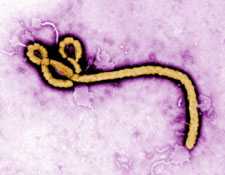EBOLA
NOTE: This page is archived for historical purposes and is no longer being maintained or updated.
The recommendations on this page are no longer in effect and will not be updated.

Non-healthcare Workers
Airline and other workers may be at risk if they are exposed to infected people who have the signs and symptoms of Ebola. Workers are also at risk if they are directly exposed to the blood or other body fluids of a patient with Ebola or to objects such as needles that have been contaminated with infected body fluids.
The CDC has developed guidance and resources for workers in non-healthcare workplace settings including:
- U.S. businesses (non-healthcare)
- Deployed Ebola responders
- Airline workers
- Airport workers
- Cargo ship workers
- Food service workers
- Funeral and mortuary workers
- Humanitarian aid workers
- Laboratory workers
- Law enforcement personnel
- School, college, and university workers
- Wastewater workers
For current information about Ebola, visit the CDC Ebola webpage .
U.S. Businesses (Non-healthcare)
Questions and Answers about Ebola for U.S. Businesses, Employers, and Business Travelers
Decontamination, Cleaning, and Waste Removal
U.S. Residence Decontamination for Ebola and Removal of Contaminated Waste
EPA Disinfectants for Use Against the Ebola Virus
OSHA Fact Sheet: PPE Selection Matrix for Occupational Exposure to Ebola Virus
Deployed Ebola Responders
NIOSH-OSHA Fact Sheet: Preventing Worker Fatigue Among Ebola Healthcare Workers and Responders
Interim NIOSH Training for Emergency Responders: Reducing Risks Associated with Long Work Hours
NIOSH Factsheet: The Buddy System
- Training Slides: Limiting Heat Burden While Wearing PPE
- Poster: Prevent Heat Related Illness - Wearing PPE Increases Your Risk for Heat-related Illnesses
Airline Workers
Guidance on Air Medical Transport for Patients with Ebola Virus Disease
Airport Workers
Factsheet for Airline Customer Service Representatives
Factsheet for Airport Retail and Food Service Workers
Factsheet for Airport Passenger Assistance Workers
Factsheet for Airport Custodial Staff
Factsheet for Airport Baggage and Cargo Handlers
Cargo Ship Workers
Food Service Workers
Questions and Answers about Ebola and Food Safety in the United States
Factsheet for Airport Retail and Food Service Workers
Funeral and Mortuary Workers
Humanitarian Workers
Advice for Humanitarian Aid Organizations
Advice for Humanitarian Aid Workers
Laboratory Workers
Law Enforcement Personnel
Ebola Information for Law Enforcement Professionals in the U.S.
School, College, and University Resources
Resources for Parents, Schools, and Pediatric Healthcare Professionals
Advice for Colleges, Universities, and Students about Ebola in West Africa
Wastewater Workers
Interim Guidance for Managers and Workers Handling Untreated Sewage from Individuals with Ebola
- Page last reviewed: December 2, 2014 (archived document)
- Content source:
- National Institute for Occupational Safety and Health Office of the Director


 ShareCompartir
ShareCompartir